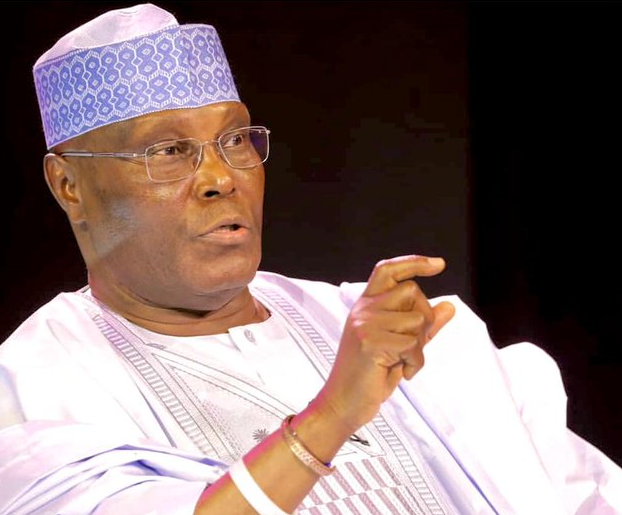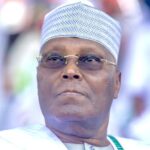Former Vice President Atiku Abubakar has been a vocal advocate for a coalition aimed at ousting the current administration under the All Progressives Congress (APC).
Atiku’s stance is based on his belief that Nigeria’s 25 years of uninterrupted democracy have failed to address the country’s significant challenges.
In his Democracy Day message, Atiku, the Peoples Democratic Party (PDP) presidential candidate in the last election, criticised the state of democracy in Nigeria, stating that it “Continually fails to deliver the promises of prosperity and liberty to the people.”
Atiku specifically blamed the last nine years of APC rule for what he described as “Extreme hardship manifested in excruciating poverty and unprecedented levels of violence and insecurity.” He accused the APC of creating a “dawn of gloom.”
Hope all is well with you’, Atiku reacts to Tinubu’s fall
Only those working for APC are against coalition – Atiku
Further, Atiku criticised the opposition parties, claiming they are “Even guiltier than the ruling party for the seeming lack of capacity to come together and galvanise a coalition that will retire the ruling party and articulate a plan of good governance that will earn the conviction of Nigerians.”
To this end, Atiku has engaged with notable opposition politicians in efforts to unify opposition figures. He believes the opposition’s failure to form a coalition is a major threat to democracy, asserting that “The fortunes of Nigeria lie in their forging a coalition.”
However, despite Atiku’s calls, the PDP leadership appears uncomfortable with the idea of a coalition or merger. Following its 587th meeting in Abuja, the PDP’s National Working Committee (NWC) declared that the party is “Not in any merger talks with another political party.” The PDP maintains that it has the capacity to win elections if conducted fairly.
Its National Publicity Secretary, Hon. Debo Ologunagba stated that the party is not contemplating a merger, noting that many Nigerians and former members are returning to the PDP, which he believes is sufficient for electoral victory.
“The National Working Committee (NWC), after its 587th meeting, restates for the umpteenth time that the PDP is not engaged in any merger, fusion or amalgamation talks with any other political party or interest,” Ologunagba said.
He emphasised that the PDP remains strong and capable of winning elections in a transparent electoral process. The NWC urged members and the international community to disregard reports of any merger talks. Ologunagba also highlighted widespread distrust in the Independent National Electoral Commission’s (INEC) ability to conduct free, fair, and credible elections, asserting that the PDP can win if elections are properly conducted.
In response to his party’s stance, Atiku has alleged that any PDP member opposing a coalition is working for the APC. During a visit from the National Coalition for PDP Support Group, Atiku insisted that voting out the APC is crucial for Nigeria’s democratic growth. He warned that PDP members against a coalition are effectively aiding the APC’s push towards a one-party state.
Despite internal disagreements, the PDP support group cautioned Atiku to be wary of party members who may not have the party’s best interests at heart.
Allegations have surfaced that some NWC members are collaborating with Federal Capital Territory Minister, Nyesom Wike to weaken the PDP. Wike, who supported President Bola Tinubu in the last election, is viewed by some party members as unreliable and a potential threat to the party’s unity.
Acting National Chairman Umar Damagum defended the decision not to suspend Wike, emphasising the party’s focus on reconciliation over expulsion. He argued that suspending Wike would be counterproductive if it led to a mass exodus of his supporters.
The Labour Party, another opposition party, has also weighed in on the coalition debate. While confident in its ability to win elections with popular support, the Labour Party is open to alliances with other political groups.
Its National Publicity Secretary, Obiora Ifoh stated that the party is preparing for the 2027 elections and welcomes any parties interested in joining forces to win.
A former presidential candidate of the African Democratic Party (ADP) and past chairman of the Inter-Party Advisory Council (IPAC), Yabagi Sani, argued that a merger, rather than a coalition, is necessary for success. He noted that the electorate needs clarity and unity from opposition parties to challenge the APC effectively.
Sani stressed the difficulty of uniting the opposition, pointing out that internal divisions must be resolved before a successful coalition can be formed. He cited the APC’s formation as a model, where parties sacrificed their identities to create a unified front.
However, a political analyst, Chudi Chukwuani supported the idea of a coalition, stating that opposition parties must subsume individual ambitions for the greater good. He argued that forming a coalition is the only viable way to defeat the APC, recalling how smaller parties united to wrestle power from the PDP in the past.
In his analysis, Chukwuani noted that “The only way to defeat APC is by forming a coalition. It is a no-brainer. It has happened in the past; the opposition parties should know that. The election that was won by President Bola Tinubu has clearly shown that they cannot win an election if they stand on their own. If you recall when PDP was in power, the smaller parties at that time had to come together, and that was how they were able to defeat and wrestle power from the PDP.”
Yabagi Sani also pointed out that the electorate in Nigeria is not always well-informed about the intricacies of political alliances, which makes a straightforward merger more effective than a coalition.
“The APC that you see today happened because the other political parties were ready to forgo their certificates and disappear, to become extinct and not to exist as political parties anymore. They now operate under one umbrella. How many parties are ready to do that today? That is the place to start. Going into a coalition might not produce the result they are looking for,” he said.
Sani stressed the need for unity among opposition parties to present a formidable challenge to the APC.
“You have to be united to be able to fight. If you are divided, how do you fight somebody? So how do they stand against the APC? They have to reconcile themselves internally before they can go together and fight. Otherwise, you will find what happened in Rivers and Oyo in PDP happening again. They will vote against themselves, score own goals all over the place.”
Sani further explained that the opposition’s internal conflicts, such as those witnessed in the PDP during the last election, where intra-party disputes led to strategic failures, are detrimental.
He said, “The main opposition parties are not there to fight for Nigeria politically, and that is where the problem lies. If they cannot get a rallying point, if you look at the Labour Party, it was a kind of expression of frustration against the system. But what killed it was the sentiment that also took the wind out of the sail of the movement.”
He elaborated on the impact of regional sentiments, saying, “In the PDP, the same sentiment worked against the party, because the reason the people from the south did not vote for the party (Atiku) in their numbers is based on that sentiment—that a southerner did not emerge as PDP presidential candidate. They assume it is the turn of the south.”
But Chukwuani noted that forming a coalition requires significant compromises. “If they can achieve it, if some of them can subsume their individual ambitions for the benefit of the coalition, then it is a good idea.”
Chukwuani believes that the only way to effectively challenge the APC is through a coalition. “It is a no-brainer. The election that was won by President Bola Tinubu has clearly shown that they cannot win an election if they stand on their own. The opposition parties should learn from the past when smaller parties came together to wrestle power from the PDP.”
He concluded by emphasising the importance of a strong, unified opposition. “Until the opposition can come together and find a strong personality with a strong hold on the street like Bola Tinubu, it would be difficult to work together. The coming together of opposition is a very good idea if they can achieve it.”
As it stands, the debate within the PDP and among opposition parties about forming a coalition highlights the complexities of Nigerian politics. While Atiku Abubakar champions unity to challenge the APC, internal party dynamics and strategic disagreements continue to pose significant hurdles.
Observers believe the future of Nigeria’s democracy may well depend on whether these opposition parties can overcome their differences and present a united front.

 Join Daily Trust WhatsApp Community For Quick Access To News and Happenings Around You.
Join Daily Trust WhatsApp Community For Quick Access To News and Happenings Around You.


